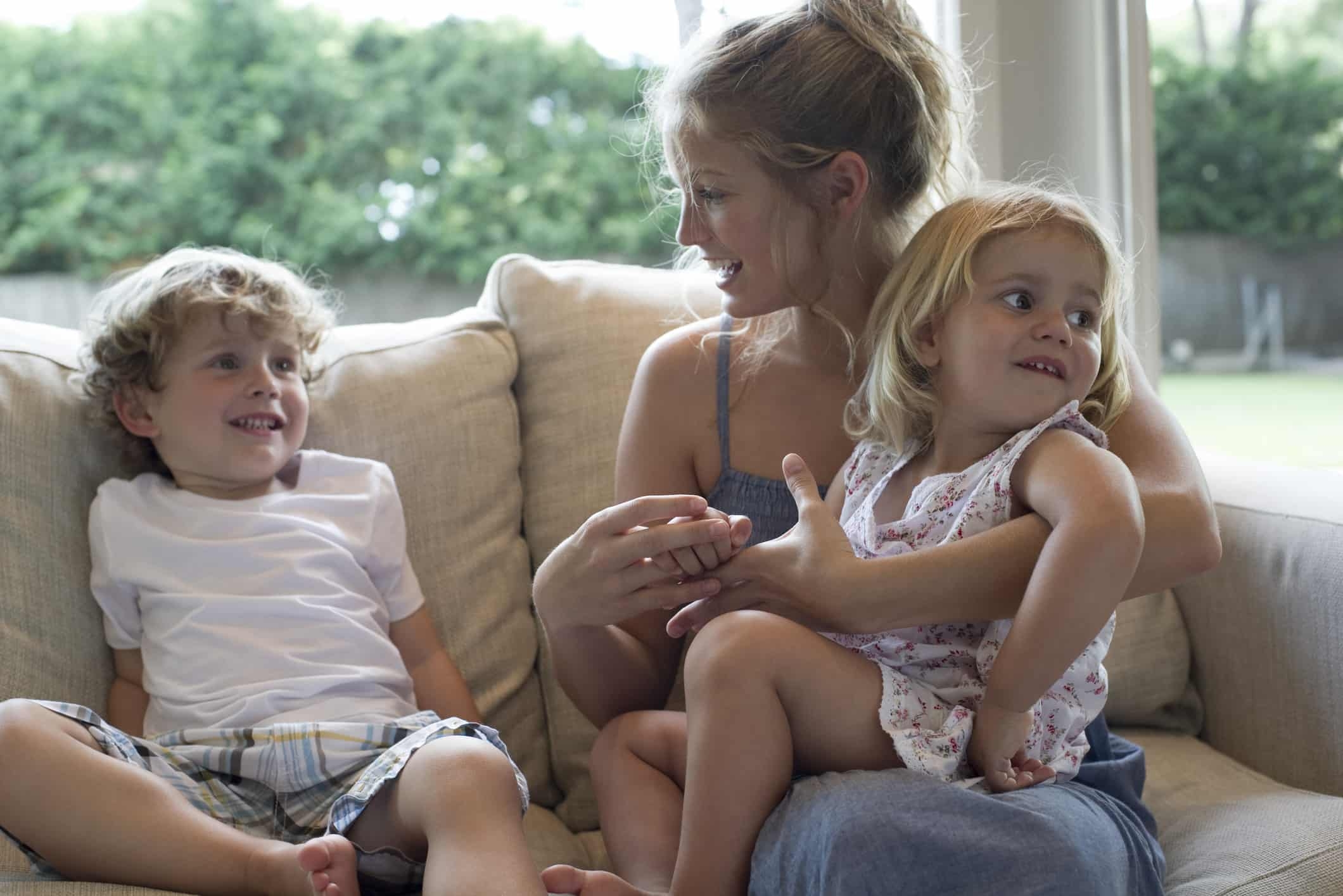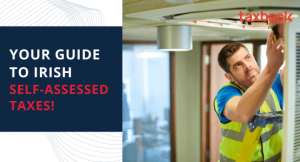Tax Relief for Parents in Ireland: Your Guide to Financial Savings
Becoming a parent is one of the most amazing (and exhausting!) experiences a person can have.
Sure, you may never sleep the same again, but the good news is that there are a number of tax benefits for parents that could help you put additional money back in your pocket.
Claiming dependents on your tax return might make a significant difference in the amount of tax you pay (or how big a refund you can receive).
New parents frequently fail to take advantage of the numerous credits and reliefs that might positively affect their family's budget. But we are here to help!
Here's a look at where parents might get tax relief while filing taxes in Ireland.
Download your FREE Irish Tax Guide
Year of marriage tax relief (plus how married couples can share their credits to save on their tax bill each year)
In the year you marry, you and your partner will continue to be treated as single people for tax purposes.
Nevertheless, if the tax you pay as two single people is higher than the tax you would pay as a married couple, you can claim the difference as a tax refund, but only taxes deducted in the months after marriage are eligible for relief.
For the years after your marriage or civil partnership, you have three options for taxation:
- assessment as single individuals (you are both taxed as single people)
- separate assessment
- joint assessment
What kind of savings are possible for married people in Ireland?
One of the main benefits of joint assessment is the ability to transfer tax credits and bands between partners.
In short, this means you can lower the amount of tax you have to pay at a higher rate, which could result in savings.
In 2024, the standard rate cut-off point for married couples/civil partners is €51,000. This part is taxed at 20%, while the balance is taxed at 40%.
When both civil partners/ spouses have income, this cut-off point is increased by the lower of:
-
€33,000 in 2024 or
-
the amount of the income of the civil partner/ spouse who earns less
If one of the partners is not working but is a stay-at-home parent, or earning less than €7,200 per year, then the other partner can claim additional tax credits worth up to €1,700 per year.
Understanding the applicable allowances and tax credits can be stressful and overwhelming. That’s why many married people in Ireland choose a tax agent like Taxback.
We can help you secure the maximum legal tax rebate depending on your personal circumstances.
2024 standard rate cut-off points
| Single Person | €42,000 |
|---|---|
| Married couple (one income) | €51,000 |
| Married couple (two incomes) | Up to €84,000* |
| One parent family | €46,000 |
In Ireland, after the marriage, you have the option to split your tax relief and credits between you and your partner.
However, PAYE tax credits and employment expenses cannot be transferred.

Medical expenses applicable for parents
If you pay for an eligible medical expense - either for yourself or for a loved one, you can claim tax relief at a rate of 20%.
In other words, if you pay for GP bills or prescriptions for your kids, you will be due a tax refund.
After the tax year has finished, you may claim for reimbursement of medical expenses for the previous year.
You can also go back four years when claiming your tax entitlements. You can only claim expenses for which you have receipts and can get a tax rebate on many medical expenses, including:
-
treatment in a hospital, or maintenance
-
consultant and doctor fees
-
maternity care
-
dental expenses*
-
items with a prescription from a doctor or a medical professional
-
ambulance transport
-
language and speech therapy
-
educational psychological assessment and more.
If your expenses are covered by a public authority or insurance policy, you won’t be able to qualify for tax relief.
*Routine dental and ophthalmic care are not eligible for tax relief, however certain specialized dental procedures, including crowns, braces, and surgical wisdom tooth extractions performed in a hospital, are.
Tuition fees for dependents
If you pay tuition fees for your child, you may be entitled to claim tax relief on:
-
Courses for undergraduates
-
Postgraduate programs
-
Courses in information technology (IT) and foreign languages
You are eligible to claim tax relief, as long as you paid the fees on your own, or on behalf of another individual.
You will not be able to claim tax relief on:
-
administration fees or examination
-
any tuition fees that are covered by a scholarship, grant, or reimbursed by an employer.
The maximum amount of fees that can qualify for tax relief is €7,000 per person per course (including the Student Contribution).
-
full-time students - For the 2022-2023 academic year, there is no tax relief on the first €3,000 spent on tuition costs (including the Student Contribution).
-
part-time students - For the academic year 2022-2023, there is no tax relief on the first €1,500 spent on tuition costs (including the Student Contribution).
-
more than one student - If you claim for more than one student, you will get full tax relief on tuition expenses (including the Student Contribution) for the second and subsequent students.
In respect of foreign language and information technology courses, the fee should cost not less than €315. The maximum amount on which relief can be claimed is €1,270.
What’s more, if you are paying to rent ‘digs’ accommodation for a child who is attending college, you will be entitled to claim the Rent Tax Credit. This credit will be increased from €500 in 2023 to €750 in 2024 and is available from 2022 (inclusive) until 2025.
The average Irish tax refund is €1,880
You can find more information on courses that qualify for tax relief here.

Single Person Child Carer Credit (SPCCC)
If you care for a child by yourself, you may be eligible for the Single Person Child Carer Credit (SPCCC) in Ireland. The annual amount of this tax credit is €1,750 in 2024. The child could be:
-
your child
-
an adopted child
-
or any kid that you care for at your own expense
In a tax year, only one parent or guardian of a child may claim the SPCCC. Even if you care for more than one child, you are eligible to claim only one credit.
You could also be eligible for an increased rate band of €4,000. At the 20% tax rate, this is an additional €800.
You are immediately due the increased rate band if you are due the SPCCC.
The key distinction between the Single Person Child Carer Credit (SPCCC) and the One-Parent Family Credit (OPFTC) is that if the child or children live with them for part of the year, both parents could claim the OPFTC. However, OPFTC was abolished on 1 Jan 2014.
In a given tax year, only one parent can claim the SPCCC.
As a primary or secondary claimant, you cannot claim the SPCCC, if you are:
- As a married couple or civil partner, you are jointly assessed
- In a civil partnership, married or separated
- Living together
* You cannot claim the SPCCC if you received the basic personal tax credit of €3,550 during the year in which you became widowed (the year of bereavement). If you qualify, you can claim the SPCCC in consecutive years
What counts as an eligible child for the SPCCC?
A qualifying child must be:
- born in the same tax year
- under 18 at the start of the tax year
- over the age of 18 at the start of the tax year but enrolled full-time at a university, college, school, or another form of educational institution
A person over the age of 18 who is chronically disabled, either before or after turning 21, may also qualify as a qualifying child (or after they reached the age of 21 while they were receiving full-time instruction in an educational establishment).
A separate Incapacitated Child Tax Credit is also available. You may learn more about getting a tax refund if you care for an incapacitated child here.
How do I claim the SPCCC?
Please fill out our short form if you need assistance claiming a tax refund for the Single Person Child Carer tax credit.
You can find more information on SPCCC in our article here.
Home carer’s tax credit
If you are in a civil partnership/married, and you care for one or more dependent people in your home, you can claim the Home Carer Tax Credit.
In order to qualify for the Home Carer Tax Credit, the dependent person must live with you and your spouse or civil partner during the tax year.
The dependent can be cared for outside of your house. If the person does not live with you, they must live next door in a neighboring house, on the same land, or within 2 kilometers of your house.
A dependent could be:
-
a child who is eligible for child benefit
-
a person who is 65 or over
-
a person who requires care because he/she is mentally or physically disabled
-
a relative by marriage or someone over whom you have legal custody

How much will I get?
For 2024, the Home Carer Tax Credit is €1,800 for 2024, an increase of €100 from 2023.
The entire tax credit can be claimed if the home carer earns up to €7,200 in their own right for the tax year.
If your income is higher than €7,200, the difference between the actual income and €7,200 is calculated and then divided in half.
You cannot claim the tax back if your income is €10,800 or higher in 2024.
We help thousands of parents to get their tax refund
When do I need to claim the Home Carer Tax Credit?
You must file a claim for the credit within four years of the end of the tax year in question. As an example, claims for the year 2020 must be submitted by December 31, 2024.
How to claim the Home Carer Tax Credit?
You can register with Taxback and check if you are owed the credit.
We'll tell you if you qualify for a deduction and whether it's the most favorable tax treatment for you.
You can find additional information on the Home Carer Tax Credit in our blog post here.
Divorce and Legally Enforceable Maintenance in Ireland
If you and your partner are getting separated, there is some important information to know about tax.
For example, both partners will be taxed as follows in the year of separation:
Jointly assessed prior to separation:
The assessable spouse will be:
-
entitled to marriage tax credits and the married rate band for the entire fiscal year;
-
taxed on their own income for the entire year as well as their ex-income partner's from the beginning of the tax year to the date of separation
The non-assessable spouse will be:
-
taxed on their income from the day of separation to the end of the tax year;
-
entitled to single rate bands and single person’s tax credit
Separately assessed prior separation
The situation is identical to that described in the joint assessment:
-
The assessable spouse prior to the claim for separate assessment is the assessable individual for the year of separation until the date of separation;
-
Any relevant unused tax credits and standard rate band for the time before separation might be transferred from one of the partners to the other one
Single assessment before the separation
There will be no changes in taxation. Both of the partners will be entitled to single rate bands and single-person tax credits. 
Legally Enforceable Maintenance
These are legally enforceable payments made due to a court order.
Such payments can include monetary payments as well as health insurance payments, mortgage payments, and so on.
If the payment is for the benefit of a kid, it is tax-free. If it is for the advantage of the spouse, it is taxable to the receiving spouse.
The person who pays can claim a deduction from his income for both PAYE and USC reasons.
Emergency tax for parents with teenagers and young adults who are starting their first job
When your child starts their first job they must notify Revenue as quickly as possible, in order to avoid emergency tax.
If your child hasn't given their new employer a PPSN or hasn't registered their new job with Revenue, they will be taxed on an emergency basis.
Your child should do this, even if it’s a part-time or temporary job, if they do not provide the PPSN, their employer will tax all their pay at the higher rate of tax (40%), instead of (20%).
How to claim emergency tax back in Ireland?
The good news is, it is possible to reclaim emergency tax deductions by applying for a tax refund in Ireland.
If you think you’ve overpaid tax, you can claim your tax back in Ireland for the previous 4 tax years.
Taxback could quide you step by step of how to claim tax back.
We help thousands of parents to get their tax refund
Why choose Taxback?
Yes, figuring out your tax entitlements, depending on your personal circumstances can be very confusing and time-consuming.
The good news is, we have 20+ years of experience and we can help you file your income tax return and claim the maximum amount of tax back in Ireland that you are entitled to.
Here is why:
-
Our tax experts will make sure that you receive every expense and relief to which you are entitled.
-
We'll transfer your maximum legal Irish tax rebates directly to your bank account, anywhere in the world
-
It's an easy online service. We do the paperwork. You get the money!
-
Have a tax question? Our Live Chat team is available 24 hours a day, 7 days a week to assist you.




